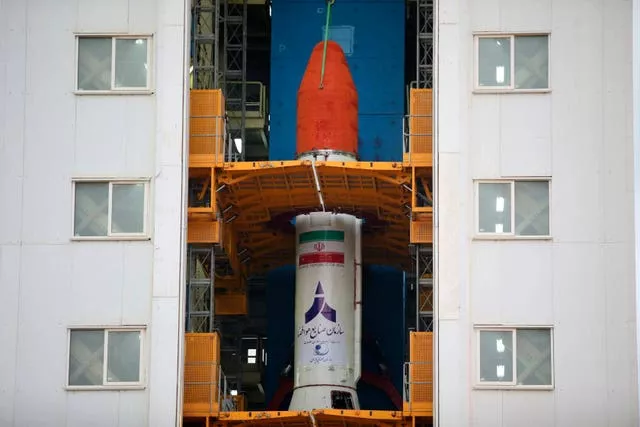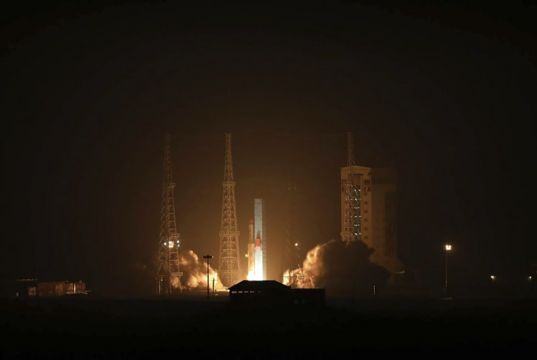Iran said on Sunday that it has successfully launched three satellites into space, the latest in a programme that the West says improves Tehran’s ballistic missiles.
The state-run IRNA news agency said the launch also saw the successful use of Iran’s Simorgh rocket, which has had multiple failures in the past.
The launch came as heightened tensions grip the wider Middle East over Israel’s continued war on Hamas in the Gaza Strip.
While Iran has not intervened militarily in the conflict, it has faced increased pressure within its theocracy for action after a deadly Islamic State suicide bombing earlier this month and as proxy groups like Yemen’s Houthi rebels carry out attacks linked to the war.

Footage released by Iranian state television showed a night-time launch for the Simorgh rocket.
An Associated Press analysis of the footage’s details showed that it took place at the Imam Khomeini Spaceport in Iran’s rural Semnan province.
State TV reporter Abbas Rasooli said in the footage: “The roar of the Simorgh (rocket) resonated in our country’s sky and infinite space.”
State TV named the launched satellites Mahda, Kayhan-2 and Hatef-1. It described Mahda as a research satellite, while Kayhan and Hatef are nanosatellites focused on global positioning and communication respectively.
Iran’s Information and Communications Technology minister Isa Zarepour said the Mahda has already sent signals back to Earth.
There have been five failed launches in a row for the Simorgh programme, another satellite-carrying rocket.
The Simorgh, or “Phoenix” rocket failures have been part of a series of setbacks in recent years for Iran’s civilian space programme, including fatal fires and a launchpad rocket explosion that drew the attention of former US president Donald Trump.
The United States has previously said Iran’s satellite launches defy a UN Security Council resolution and called on Tehran to undertake no activity involving ballistic missiles capable of delivering nuclear weapons. UN sanctions relating to Iran’s ballistic missile programme expired last October.
The US intelligence community’s 2023 worldwide threat assessment said the development of satellite launch vehicles “shortens the timeline” for Iran to develop an intercontinental ballistic missile because it uses similar technology.
Under Iran’s relatively moderate former president Hassan Rouhani, the Islamic Republic slowed its space programme for fear of raising tensions with the West.
However, in the time since, the 2015 nuclear deal Mr Rouhani shepherded with world powers has collapsed and tensions have been boiling for years with the US.

Hardline president Ebrahim Raisi, a protege of Supreme Leader Ayatollah Ali Khamenei who came to power in 2021, has pushed the programme forward.
Meanwhile, Iran enriches uranium closer than ever to weapons-grade levels and enough material for several atomic bombs, though US intelligence agencies and others assess Tehran has not begun actively seeking a nuclear weapon.
Tehran maintains the largest arsenal of ballistic missiles in the Middle East, in part due to decades of sanctions following its 1979 Islamic Revolution and the US Embassy hostage crisis blocking it from advanced fighter jets and other weapon systems.
The US military and the State Department did not immediately respond to requests for comment.
However, the US military has quietly acknowledged a successful Iranian satellite launch on January 20 carried out by the country’s paramilitary Revolutionary Guard.
Meanwhile on Sunday, the UK’s Ministry of Defence acknowledged one of its warships shot down a drone launched by the Houthi rebels from Yemen. The HMS Diamond shot down the drone with its Sea Viper missile system in the Red Sea, causing no damage or injuries, it said.
“These intolerable and illegal attacks are completely unacceptable and it is our duty to protect the freedom of navigation in the Red Sea,” the MoD said in a statement.
The Houthis did not acknowledge the attack. The rebels have said US and British ships are now targets in their campaign of attacks that they say is aimed at pressuring Israel to stop the war on Hamas in the Gaza Strip.







